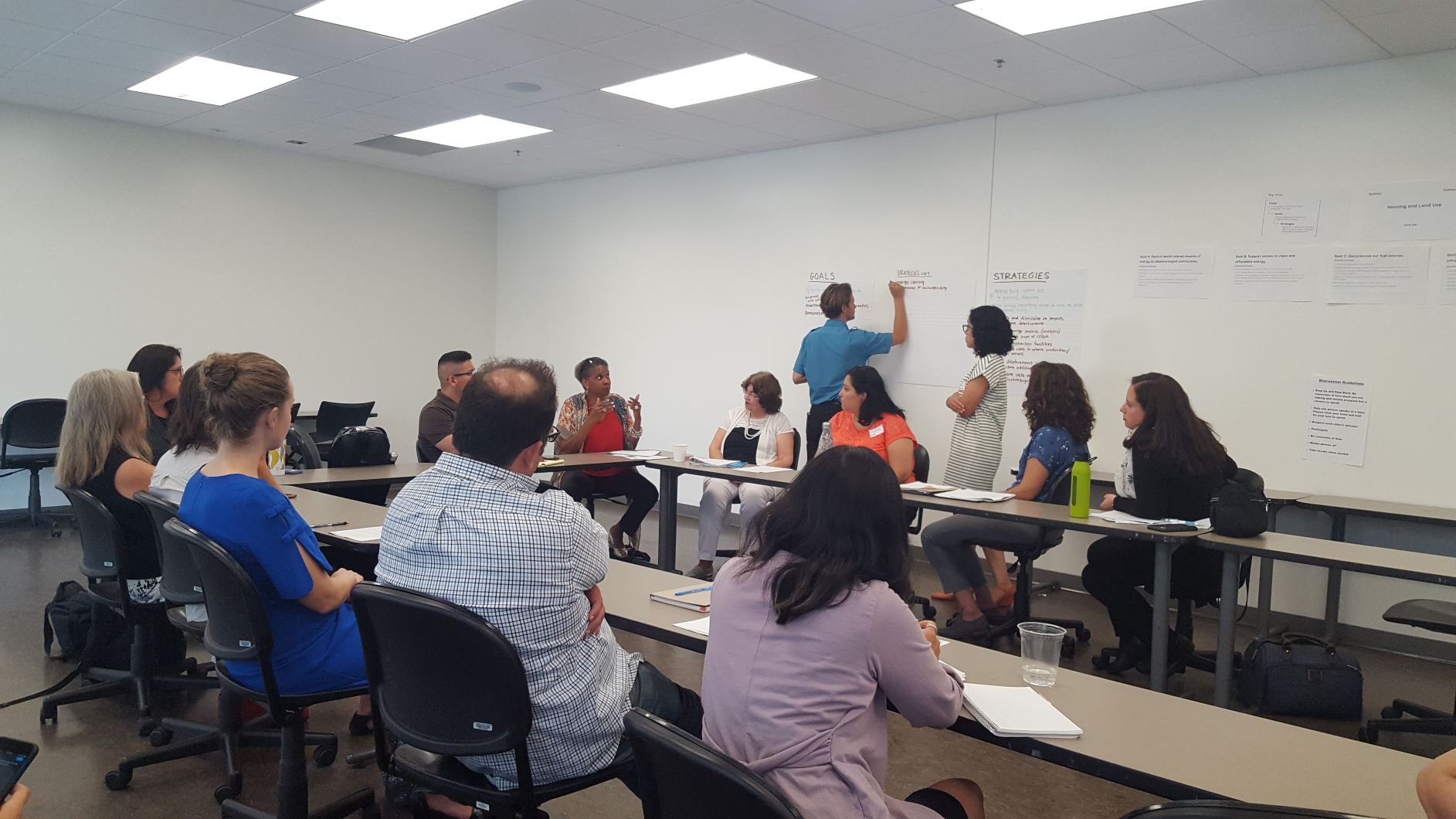The “Our County” Stakeholder Engagement Team invited nonprofit organizations throughout Los Angeles County to provide input on the topic of Energy for the County’s first Sustainability Plan.

The “Energy and People” workshop, held on July 13, 2018 at the Los Angeles Trade Technical College, attracted over 50 attendees from nonprofit organizations, several public agencies, and members of the “Our County” Stakeholder Engagement team.
The workshop provided an explanation of how the “Our County” plan will be developed and an overview of energy issues the County faces. After introducing the Energy Goals from the Our County Energy and Climate Briefing document, attendees provided general feedback in a plenary discussion format. In the second session, attendees were broken up into three different groups according to their topic of interest (Housing and Land Use, Economy and Workforce Development, and Public Health and Safety). Participants in each morning section were asked to provide comments on the proposed Energy Goals related to the topic, and then rotated into the next two topics areas to provide comments.
In the afternoon, participants were divided into seven focus groups (Public Health and Safety, Air Quality and Land Use, Jobs and Business Development, Housing and Land Use, Resilience and Displacement, Climate, and Environmental Stewardship) as part of an interactive exercise that allowed participants to propose alternative or additional priority recommendations.
While each nonprofit organization brought their own unique set of recommendations and input for the “Our County” plan, there was general support for the proposed Energy Goals as presented in the Briefing document. Additionally, several common themes emerged throughout the workshop that either seek to address missing issues or enhance the Energy Goals. The following are the top energy-related themes identified, in no particular order:
Key Recommendations
- Strengthening community engagement, representation, and accountability in energy policy decision-making and governance was consistently emphasized. Many attendees were in support of stronger partnerships with nonprofit organizations and local businesses to more equitably facilitate environmental regulatory enforcement and implementation of incentive programs. Many advocated for a decentralized, distributed and locally-owned energy system, particularly in low-income neighborhoods with multi-family housing.
- Adoption of a Green Jobs Action Plan that establishes comprehensive standards to generate good-paying, local jobs in the shift to a renewable energy sector and green economy. From design to construction to ongoing maintenance, the policy would set workforce education, training and development strategies across all environmental sustainability areas. Targeting local hire programs that focus on vulnerable populations (veterans, formerly incarcerated, etc.) with a pathway towards family-supporting income levels was of key importance, along with developing a “just transition” program that would assist workers displaced from fossil fuel industries with income stability and job retraining.
- Striving for the elimination (not just reduction) of negative health impacts and safety risks from energy generation, storage, and transport and the recognition of cumulative impacts, with a prioritization on frontline communities. Attendees emphasized the need for stronger enforcement measures, better resident education on disaster preparedness, and specified targets for phasing out polluting facilities, particularly neighborhood oil drilling.
- Increasing access to community ownership of renewable energy that meets the needs of diverse populations of different abilities, incomes, housing status, and cultures. Dozens of comments advocated for more flexible qualification criteria for energy efficiency and clean energy programs, particularly for renters; comments also called for targeted investments for disadvantaged communities that meet community needs. Further, there was significant concern on how to avoid gentrification and displacement from energy investments that increase the value of individual properties and neighborhoods.
- Promoting culturally meaningful public education to increase energy literacy on energy production and consumption, helping residents to understand the cumulative impacts of energy choices and behaviors, and “life cycle” costs. Comments ranged from better outreach on available renewable energy programs to making documents and application processes more language-accessible.
Comments on the key recommendations can be directed to sustainability@lacounty.gov.
Read more in the Energy Nonprofit Workshop Summary
Download the Energy Nonprofit Workshop Notes
Download the Energy Nonprofit Workshop Presentation
Download the Our County Energy and Climate Briefing
